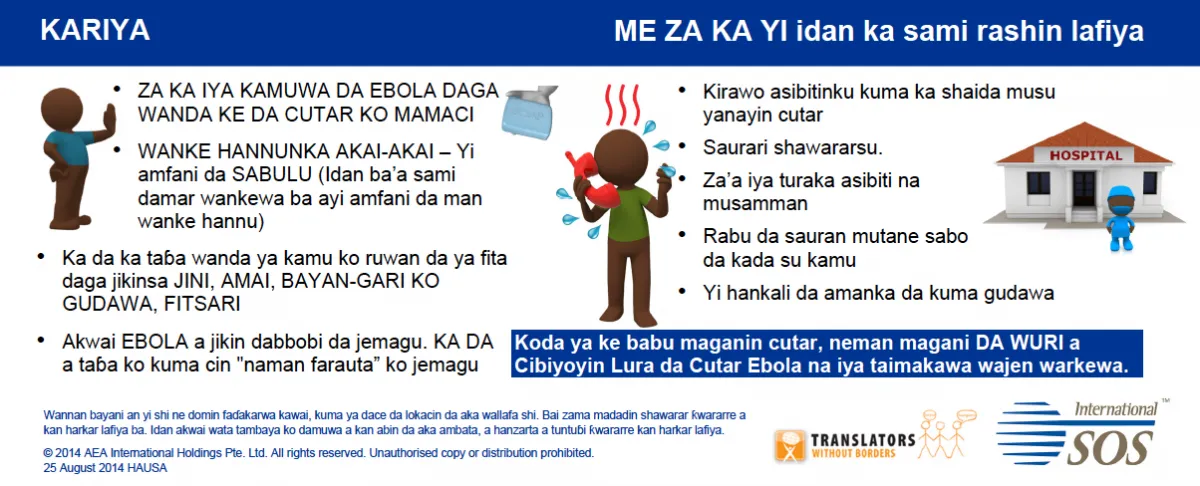Life saving messages go online in the right language

‘’Sirikali tafadhali, niko saidi mbaya kabisaa, saidia, hata watoto zangu sijui zimeenda wapi jamaneni , naomba sirikali iingilie!!’’ This is a quote of a woman, talking in Swahili on a national television during floods at Budalangi in Western Kenya, a place frequently affected by floods. But what is she saying? She is pleading for help: She is badly off, she has lost everything, she doesn’t know where her kids are, and she is asking the government to intervene.
This is a clear example that communication in the right language matters more than ever to affected communities and aid workers before, during and after a disaster. The woman quoted above speaks and understands Swahili better, and in times of trouble, she must communicate in Swahili. She should have received information on preparing for the flood and for recovery in Swahili. Now, thanks to the Words of Relief program from Translators without Borders, she can.
Translators Without Borders is providing the final step to helping affected populations prepare and recover from crises: translation. How can we expect people to overcome disaster and prepare better when we provide them information in a language they don’t understand, or that is their third or fourth language? Translators without Borders’ Words of Relief comes in handy to eliminate linguistic barriers that can impede vital response and relief efforts during and after a crisis one piece of Words of Relief is to translate key crisis and disaster messages into languages around the world and disseminating them openly before crises occur.
As we approach the heavy rains in Kenya, it is such a relief to the National Disaster Operation Centre (NDOC) a Kenyan government agency, and other Aid agencies have Facts on Flood preparedness in Swahili. It was a wow response from the Director of the NDOC, to hear that we have floods preparedness and Ebola information on Humanitarian Site in Swahili. He said this will be very helpful to them since it will speedily and effectively enhance their Floods and Ebola awareness campaigns.
The month of August has been a busy one for the Words of Relief team. We have started posting our key crisis and disaster messages on the Kenya Humanitarian Response site. The messages included but are not limited to: CDC Facts of Floods Preparedness, Crisis Messages from Humanity Road, Cholera messages from IFRC, INFOASAID Message library and Ebola brochure from CDC. All translated into Swahili! https://kenya.humanitarianresponse.info/
The Aid workers/government officials, who have limited time and resources, engage in many campaigns and have the responsibility to ensure that the affected people get critical information as quickly and effectively as possible. Hence the need to translate their disaster messages and disseminate them openly before a disaster occurs.
Consequently, our co-founder Lori Thicke was interviewed the BBC World Service in London on the Ebola Crises in West Africa, and it was very clear that translation is playing a big role in eliminating the linguistic barriers that were a hindrance to effective response to the crisis. Translators Without Borders stepped in and helped and still is helping in translating Ebola prevention messages into Nigeria’s local languages.

https://www.internationalsos.com/ebola/index.cfm?content_id=398&language...
TWB’s Founder, Lori Thicke spoke about this in interviews with Bloomberg and BBC World Service:
http://www.bloomberg.com/news/2014-08-11/africa-s-biggest-city-fights-wicked-lies-to-debunk-ebola-myths.html
https://soundcloud.com/bbc-world-service/world-update-translators-without-borders-take-on-ebola?utm_source=soundcloud&utm_campaign=share&utm_medium=twitter
And Eddie Izzard, the British actor and comedian is a fan! He tweeted: These guys are great @TranslatorsWB's Ebola advisory in Hausa (most spoken language in West Africa). Saving lives with local languages…http://www.whosay.com/l/gph97Ke
As the month came to a close, we recruited our rapid response volunteer translators for the Spider Network. They come from 11 Kenyan regions commonly affected by disasters and will participate in a 3-day translation training at our Nairobi Centre in the first week of September.
It will be an exciting event, having 12 volunteers representing 11 languages, 11 counties and different disasters experienced in the country. Stay tuned…
Stay updated
Sign up for our newsletter to receive regular updates on resources, news, and insights like this. Don’t miss out on important information that can help you stay informed and engaged.
Explore Elrha
Learn more about our mission, the organisations we support, and the resources we provide to drive research and innovation in humanitarian response.


.png)